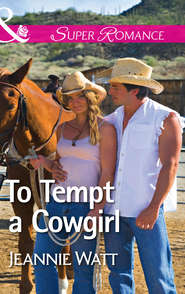По всем вопросам обращайтесь на: info@litportal.ru
(©) 2003-2025.
✖
Cowgirl in High Heels
Автор
Год написания книги
2019
Настройки чтения
Размер шрифта
Высота строк
Поля
“If I can get him into the truck. He can barely walk.”
“Want me to call Mitch?” Ryan asked. His bull-riding friend had helped contain Walt on a previous occasion.
“I’ll get someone here at the bar to help me.”
“All right,” Ryan said. “Let me know if you have any trouble.” As soon as he hung up, he punched his mother’s number and explained the situation.
Lydia Madison responded with a heavy sigh, which Ryan read more as resignation than annoyance. “The extra room’s ready for him.”
“Want me to come back to town, help you with him? He’s upset about the new owners coming to stay at his house.”
“Get some sleep,” Lydia said. “He’ll be okay in the morning. I’ll feed him some ham and eggs, keep him here until you or Francisco can come and get him.”
“I’ll see you then,” Ryan replied. “Thanks, Mom.”
“Get some sleep!”
He’d do his best because tomorrow was probably going to be one hell of a day. The owners would undoubtedly want to talk to Walt—they always did—and Ryan needed to make sure the guy was in decent shape for the meeting, which was never an easy task.
The hell of it was that he had no idea how long the owners planned to stay, and he was only going to be on the ranch for a few days before he had to leave again for the next rodeo halfway across the state. He didn’t want to add more to Jessie and Francisco’s workload, but the chances of Walt coming to terms with his demons by the weekend bordered on nonexistent.
Sometimes he wondered if the old man was ever going to get over having to sell the ranch. Would ever forgive himself for overextending, borrowing recklessly and then having it all come crashing down on him during a perfect storm of drought, wildfire and recession.
Enter the rich people.
If there’d been any way for Walt to support himself other than staying on as manager, Ryan would have quit and gone with him. But no one wanted to take on a seventy-year-old cowboy who’d lived on only one property for his entire life—a guy whose management methods had been behind the times until recently, which hadn’t helped when he’d started to get into trouble.
Walt blamed only the times.
Ryan never argued with him, though he had cause. Walt had been the closest thing to a real father he’d had.
Ryan rounded the last corner before the main house and, sure enough, the lights were on...seemingly all of the lights. The house was long and low, with a roofed porch on three sides. Walt’s grandfather had built the place and his father had added on. It was spacious and comfortable and Walt had always been so proud of his house—so of course Mrs. Bradworth had plans to gut the place before they took up permanent residence.
If they took up permanent residence. And lasted. Most rich transplants stayed an average of five years before the brutal Montana winters convinced them to use their hobby ranches as summer getaways and hunting camps.
Ryan rolled to a stop next to the barn. He’d already grained PJ and rubbed him down before starting the long trip home, so all he had to do was unload him and put him out into the pasture with his buddies before collapsing onto the sofa with a beer. Maybe get that sleep his mom had spoken of.
Ryan waved the horses back and led the big gelding through the gate and released him. PJ put his nose down, blew at the grass then ambled off as Ryan coiled the lead rope.
Normally he would have left the truck right where he’d parked it, but not tonight. The Bradworths had requested that there be no parked equipment in sight while they were in residence, and since Mrs. Bradworth was a bit of a stickler for rules, he didn’t want to do anything to set her off—even if he’d probably have the truck moved by the time she rolled out of bed. During the week they’d stayed, shortly after purchasing the place and saving Walt’s financial ass, he’d never known them to show signs of life before 9:00 a.m.
Ryan parked behind the barn, with only the nose of his truck offending the Bradworths’ view. He walked toward his dark house, his steps slowing before mounting the one step leading onto his porch as he caught sight of a shadow moving across the curtained bay window of the main house. A second later the shadow, obviously female, crossed again, going in the opposite direction.
Ryan stopped at his porch and stood, the rope and halter hanging from one hand, watching as the shadow moved back and forth. Back and forth.
He had a bad feeling about this.
A pacing woman was never a good sign.
* * *
THE SOUND OF the engine, followed a few minutes later by the hollow clang of a metal horse-trailer door opening, had come as a welcome relief after hours of silence. Less than five minutes after the truck had pulled in, the night was once again quiet, but Ellie felt better knowing that there was another human being within shouting range. She’d thought she’d been prepared for isolation when she’d embarked on this trip, but she hadn’t realized just how isolated she would feel in the big house surrounded by nothing but trees and fields and strange noises. The satellite TV wasn’t hooked up yet, so she had nothing to watch. The internet service was also disconnected, and her phone only worked in certain parts of the house.
Alone.
With her thoughts.
But worse than being alone, she felt disoriented. Unfocused. The only other time in her life when she’d felt this unsettled had been when her mother had dropped her off at boarding school with the clipped assurance that she’d like it there and she would make friends. Her mother had been right. She’d met Kate and bonded within a matter of days, but here she didn’t foresee any bonding occurring—not unless Jessie Garcia turned out to be a lot friendlier than she first appeared.
You didn’t come to the ranch to bond. You came to get a grip.
But here she was in her new sanctuary, where she’d assumed that the peace of the surroundings, the distance between her and Nick—the now happily married father of her baby—would give her some perspective, yet she felt exactly the same in a different environment. Angry, scared, unfocused.
The situation still seemed unreal. And the baby who had so disrupted her life seemed equally unreal. So far she’d had no symptoms of pregnancy other than sore breasts, but she’d been assured that the baby was real by trained medical personnel. Twice.
When would it feel real?
Soon, she assured herself. Everything would fall into place and she’d know what to do. She just had to acclimate to her new surroundings and then make a plan. Once she had a plan, she would feel better. More grounded and able to make decisions about the next steps in her life.
But her brain wasn’t listening and her thoughts continued to tumble over one another.
When she couldn’t focus, Ellie moved, but there was no treadmill at the ranch, so she couldn’t run until she was exhausted as she’d sometimes done in her town house when work pressures got to her. She ended up walking the floor, focusing on making slow, even steps, clearing her mind, ordering her thoughts.
The house was sparsely furnished, so pacing was easy—she probably could have jogged if she’d wanted to. When Milo had bought the ranch, the owner had become the manager and had moved his belongings to the small staff house that Ellie had passed on her drive in. Angela had bought some bare-bones furniture to see them through their first visit—bare bones to Angela anyway: two expensive leather chairs, a pecan dining-room set, a bureau and a bed with a wrought-iron headboard for each bedroom. Most of the linens were still in their original wrappers and the towels had price tags on them. Angela was no cook, so the kitchen was also bare bones—to the point that Ellie wondered how’d they’d eaten during their stay. There was, after all, no takeout close by.
Earlier in the day Ellie had busied herself making the bed, taking an inventory of her food supply, familiarizing herself with her deserted surroundings, although she didn’t stray too far from the house and its untended yards. Frankly, she’d expected the house to be prepared for her when she arrived—and was certain that Angela had, too—but something had gone awry. She could live with that. People made mistakes. The lack of communication between Mr. Feldman and Jessie might have an easy explanation. She hoped it did. There was still no ranch staff to be found, but as Jessie had said, it was Sunday.
After eating a dinner of canned soup, she’d tackled the office, the one place that had been left fairly intact after the owner had moved out, hoping to find employment records that Milo had thought might be there—or any records that she understood—to help fill the evening hours. No luck. And then once night had fallen, she’d pulled the curtains and sat in one of the leather chairs and stared out across the room. The silence had almost hurt her ears. She’d tried reading on her phone; listening to music. Nothing helped with the thoughts jumbling on top of one another, so finally she’d resorted to pacing.
She preferred running—toward a goal if possible. And that was the problem. Until she had a goal, a written plan, she wouldn’t be able to relax.
So instead she continued pacing, trying to order her thoughts.
Ellie didn’t know what time she’d finally crawled into bed and fallen asleep, but she did know what time she woke: nine o’clock on the nose, when her phone rang. She rolled over in her unfamiliar bed to answer it.
“Hello, Ellie? How are you finding Montana?” her aunt inquired in her languid voice.
“So far, so good.” Ellie lay back against the pillows and pushed her hair away from her forehead with one hand.
“Have you talked to your mother yet?” Which was code for, Have you told her you’re pregnant?
“Not recently.” Nothing new there. She’d traveled the globe without much contact with her mother, and vice versa. She was actually closer to her aunt, which was rather sad, considering the fact that Angela wasn’t going to win any Mother of the Year awards herself. But she was slightly less self-centered than her sister.
“What do you think of the house?”
“It’s...rustic,” Ellie said, feeling it best not to mention that she’d found herself unable to imagine either her aunt or her uncle living there.
“I know,” Angela said on a groan. “I have some work ahead of me. Sorry about the lack of furniture.”











